| Srl | Item |
| 1 |
ID:
140496


|
|
|
|
|
| Summary/Abstract |
This article describes a new effort to engage in analytic outreach between academic scholars and intelligence analysts on the issue of emerging biotechnology threats to US national security. The context of this outreach was a September 2012 meeting in London to explore possibilities for enhanced analytic outreach in relation to emerging biotechnology threats, supported by the UK Genomics Policy and Research Forum. This meeting consisted of a mix of current and former intelligence practitioners and policy officials, and social science and scientific experts, from both the UK and the US. As will be described below, this unique pairing of experts and subjects revealed new insights into how to improve intelligence assessments on biotechnology and bioweapons threats. It also revealed continuing challenges in reforming assessments within existing intelligence work routines.
|
|
|
|
|
|
|
|
|
|
|
|
|
|
|
|
| 2 |
ID:
060063
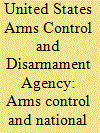

|
|
|
|
|
| Edition |
2nd ed.
|
| Publication |
Washington, D.C., United States arms control and disarmament agency, 1970.
|
| Description |
33p.
|
|
|
|
|
|
|
|
|
|
|
|
Copies: C:1/I:0,R:0,Q:0
Circulation
| Accession# | Call# | Current Location | Status | Policy | Location |
| 006643 | 327.1740973/UNI 006643 | Main | On Shelf | General | |
|
|
|
|
| 3 |
ID:
119019
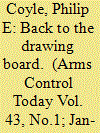

|
|
|
| 4 |
ID:
119138
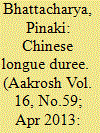

|
|
|
| 5 |
ID:
109552
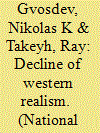

|
|
|
|
|
| Publication |
2012.
|
| Summary/Abstract |
WHEN OPERATION Odyssey Dawn commenced in the skies over Libya on March 19, 2011, it represented a major turnaround in U.S. policy. Only nine months earlier, U.S. ambassador Gene Cretz had characterized the regime as a "strategic ally" of the United States due to Libyan cooperation on counterterrorism and nonproliferation issues (and its halting, tentative steps toward greater openness). Now Libya found itself on the receiving end of conventional U.S. military power for repressing a civilian population agitating for governmental change.
|
|
|
|
|
|
|
|
|
|
|
|
|
|
|
|
| 6 |
ID:
105040
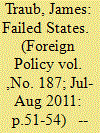

|
|
|
|
|
| Publication |
2011.
|
| Summary/Abstract |
Only some of them. It has been a truism of U.S. foreign policy since the 9/11 terrorist attacks that the United States is, in the words of President George W. Bush's 2002 National Security Strategy, "threatened less by conquering states than we are by failing ones." Defense Secretary Robert Gates has said that over the next 20 years, the gravest threats to America will come from failing states "that cannot meet the basic needs -- much less the aspirations -- of their people." Both as candidate and as president, Barack Obama has repeated this claim and has sought to reorient policy toward the prevention of state failure.
|
|
|
|
|
|
|
|
|
|
|
|
|
|
|
|
| 7 |
ID:
116160
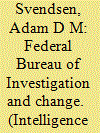

|
|
|
|
|
| Publication |
2012.
|
| Summary/Abstract |
In this article, shortcomings with US domestic counter-terrorism intelligence and associated efforts since 2000 are analysed. Potential suggestions for the extended development of the Federal Bureau of Investigation (FBI) are then discussed. Some of these propositions touch on developments involving the domestic intelligence and security services of other countries, and explore their use concerning the future optimization of the FBI in the area of domestic counter-terrorism intelligence. Within the overall culture and operational approach of the FBI, today greater sustained emphasis still needs to be accorded to the 'intelligence methodology' of 'wait and watch'. Simultaneously, the FBI needs to keep moving more from mainly a post facto emphasis to more of an a priori one in its investigations. Thereby, the FBI can continue to move towards improved delivery and better meet its role as a guarantor of US national security in a timely manner as the twenty-first century progresses.
|
|
|
|
|
|
|
|
|
|
|
|
|
|
|
|
| 8 |
ID:
115070
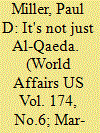

|
|
|
|
|
| Publication |
2012.
|
| Summary/Abstract |
Neither President Barack Obama nor the Republicans competing to run against him are eager to talk about the war in Afghanistan. The electorate certainly doesn't want to hear about it. Defense analysts are acting like it ended when Iraq did. Even more amazing is that most analysts and policymakers seem to believe that, one way or another, it doesn't actually matter very much that it didn't.
|
|
|
|
|
|
|
|
|
|
|
|
|
|
|
|
| 9 |
ID:
125997
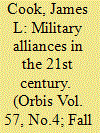

|
|
|
|
|
| Publication |
2013.
|
| Summary/Abstract |
While military alliances have always been important to the United States, some experts wonder about their future. In today's uncertain security environment, they question whether these alliances may have outlived their usefulness. The author argues that U.S. national security leaders face some difficult choices as they formulate strategy and determine the number and types of collective security arrangements the nation will require to secure its national interests in the future.
|
|
|
|
|
|
|
|
|
|
|
|
|
|
|
|
| 10 |
ID:
111790
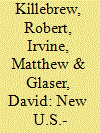

|
|
|
| 11 |
ID:
114704
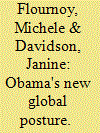

|
|
|
|
|
| Publication |
2012.
|
| Summary/Abstract |
Tough economic times are often met in Washington with calls for retrenchment. But for decades, write two former top Pentagon officials, long-term forward deployments of U.S. forces and robust alliances have guaranteed stability and uninterrupted trade, the very conditions the United States needs for economic prosperity. The Obama administration gets it.
|
|
|
|
|
|
|
|
|
|
|
|
|
|
|
|
| 12 |
ID:
097807
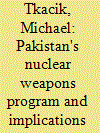

|
|
|
|
|
| Publication |
2010.
|
| Summary/Abstract |
This article analyzes Pakistan's nuclear weapons program and the characteristics of the environment in which the program is nested. These characteristics include Pakistan's history of internal and external instability; nuclear saber-rattling during crises; support for Islamic terrorism in order to advance state goals; indigenous production of many elements of its nuclear forces; possession of delivery and command and control systems with destabilizing characteristics; and, finally, nuclear doctrine that appears to advocate first use of nuclear weapons. The article argues that the characteristics of Pakistan's nuclear weapons program generate threats to US national security interests. The article examines six interrelated and synergistic challenges for US national security: first, Pakistan is engaged in an arms race in Southwest Asia that has negative implications for Pakistan's stability; second, the threat of nuclear proliferation from Pakistan continues; third, Pakistan's arsenal characteristics make accidental and/or unauthorized nuclear war more likely; fourth, there is an ongoing possibility of war with India; fifth, Islamist influence is spreading through key sectors of Pakistani society; and, finally, there is an increasing danger of state failure in Pakistan.
|
|
|
|
|
|
|
|
|
|
|
|
|
|
|
|
| 13 |
ID:
105219
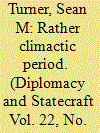

|
|
|
|
|
| Publication |
2011.
|
| Summary/Abstract |
From the late 1950s, American officials moved toward a proper appreciation of tensions in the Sino-Soviet alliance. However, prior to Autumn 1962 uncertainty remained in Washington over Beijing's willingness to break with the Kremlin in pursuit of its ideological objectives and national ambitions. This article demonstrates how the Sino-Indian border war in November 1962 and Beijing's response to the Cuban Missile Crisis shaped American understandings of the Sino-Soviet dispute and the China threat. Following developments in Autumn 1962 officials in the Kennedy Administration found cause to believe that China was not only the more militant of the two communist powers, but also that it was the more dangerous. This shift in threat perception had a significant impact on the US national security discourse, reinforcing the conviction of senior officials in Washington that the containment of China required a continued policy of non-engagement.
|
|
|
|
|
|
|
|
|
|
|
|
|
|
|
|
| 14 |
ID:
132475
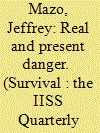

|
|
|
|
|
| Publication |
2014.
|
| Summary/Abstract |
The latest US assessments drive home the fact that dangerous climate change is not just a future risk. It is already here.
In parts of southern Florida, residents are seeing their streets flood at high tide as decades-old coastal defences fail to cope with sea-level rise. In Alaska, thawing permafrost is causing more than $10 million per year in damage to roads, runways and other infrastructure. The amount of precipitation in the northeast has increased by 8% since 1991 compared to the long-term average, but the amount falling in extremely heavy rainstorms or blizzards has risen by 71%. Nationally, river flooding has remained constant, but it has increased dramatically in the northeast and Midwest and fallen in the southeast and southwest. Nearly 20% of Arizona and New Mexico's forest land suffered heavy damage from wildfires and pest outbreaks due to warming and drought between 1984 and 2008. Insurance against climate-related disasters is becoming increasingly expensive in some places, and unavailable in others.
|
|
|
|
|
|
|
|
|
|
|
|
|
|
|
|